Key takeaways:
- Corruption research reveals the human cost of corruption through heartbreaking stories and emphasizes the need for transparency and robust legal frameworks.
- Legal insights are crucial for identifying corruption loopholes and developing effective anti-corruption strategies through collaboration between lawyers and researchers.
- Common types of corruption include bribery, nepotism, and fraud, illustrating the pervasive impact of corruption on public trust and institutional integrity.
- Practical legal advice can transform vague ethical concerns into actionable policies, highlighting the importance of continuous legal education and proactive measures in organizations.
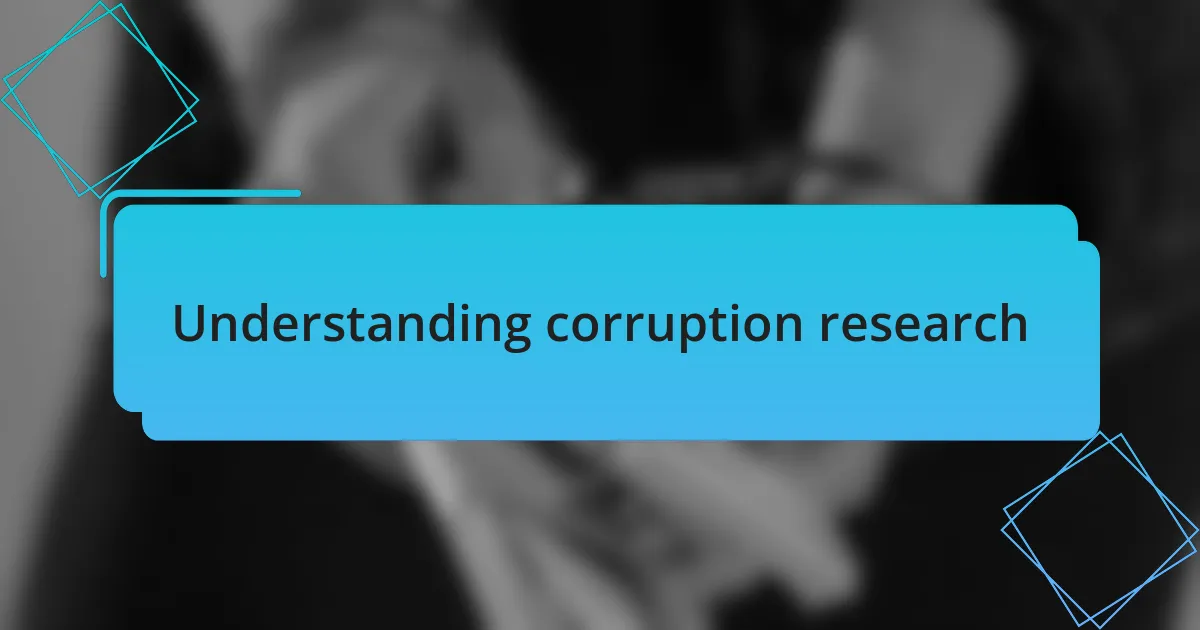
Understanding corruption research
Corruption research is a fascinating field that dives deep into the intricacies of power, ethics, and accountability. Whenever I discuss this with lawyers, I realize how they emphasize the fine line between legality and corruption, often citing real cases that illustrate this tension. How often do we stop to consider the gray areas where laws may bend?
In my conversations with legal experts, I’ve encountered the heartbreaking stories of individuals who have suffered due to systemic corruption. One lawyer shared a case that left a lasting impression on me—an employee who had witnessed illegal activities but faced serious repercussions for speaking out. Listening to such narratives makes you truly understand the human cost of corruption beyond just statistics.
Additionally, I’ve learned that effective corruption research isn’t just about identifying wrongdoing; it’s also about finding solutions. I often ask, what practical steps can we take to foster better governance? The insights lawyers provide, grounded in their experiences, have shaped my understanding of the importance of transparency and the need for robust legal frameworks to combat corruption.
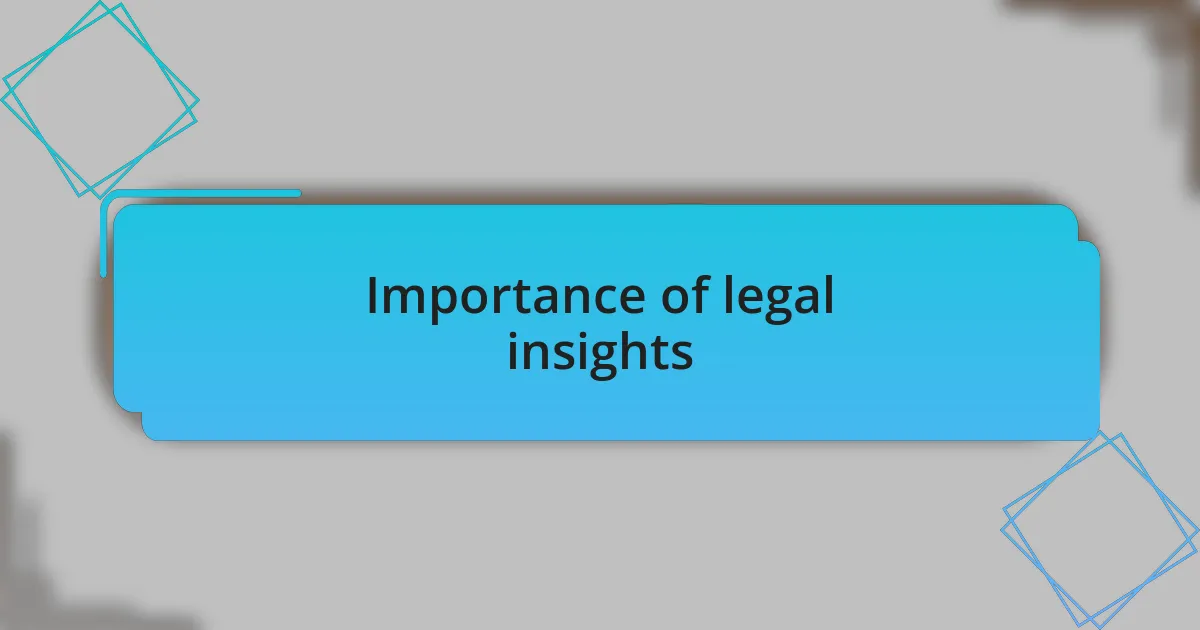
Importance of legal insights
Legal insights play a crucial role in unpacking the complexities of corruption. During a particularly eye-opening conversation with a lawyer, I learned how laws often create loopholes that can be exploited. Isn’t it alarming how something as critical as justice can sometimes be twisted into a tool of oppression?
I’ve come to appreciate the depth of legal knowledge in forming effective anti-corruption strategies. One lawyer I spoke with shared a compelling example of how understanding legal frameworks allowed a community to successfully push back against unethical practices. This highlights how essential legal acumen is—not just in prosecutions but also in advocacy and reform efforts.
Moreover, the insights I’ve gained emphasize the importance of collaboration between legal professionals and researchers. Lawyers offer a unique perspective on the legal ramifications of corruption that can influence policy recommendations. How can we bridge the gap between legal expertise and research in a way that fosters real change? By integrating these insights, we can develop more holistic approaches to combating corruption.
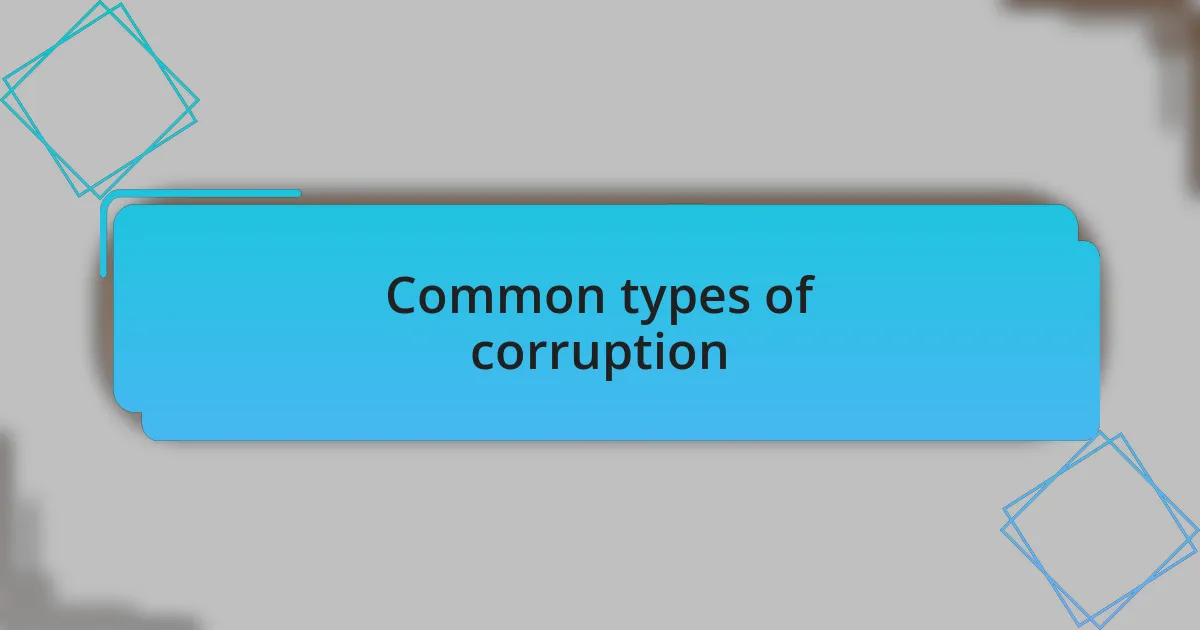
Common types of corruption
Corruption manifests in various forms, impacting societies worldwide. For instance, bribery is perhaps the most recognizable type, involving a payment made to influence the actions of an official or a person in authority. I remember a conversation with a lawyer who described a case where a company funneled money to a government official to secure a lucrative contract. It struck me how pervasive this issue is, infiltrating sectors from healthcare to infrastructure.
Another common type of corruption is nepotism, where individuals in power favor relatives or close associates, often bypassing others who are more qualified. It’s disheartening to think that merit is sometimes overlooked in favor of personal connections. A lawyer once highlighted a situation where a local government appointed a family member to a key position despite widespread dissent. This conversation made me realize how damaging such actions can be to public trust and institutional integrity.
Finally, fraud, including embezzlement and financial misconduct, remains a significant challenge. I recall a personal conversation with a legal expert discussing a high-profile embezzlement case that revealed systemic failures in oversight. The emotions during that discussion were palpable—there was a shared sense of disbelief at how easily trust can be betrayed. Aren’t we all vulnerable to the deceptive allure of power and gain? These experiences have deepened my understanding of how essential it is to recognize these forms of corruption in our ongoing fight for transparency and justice.
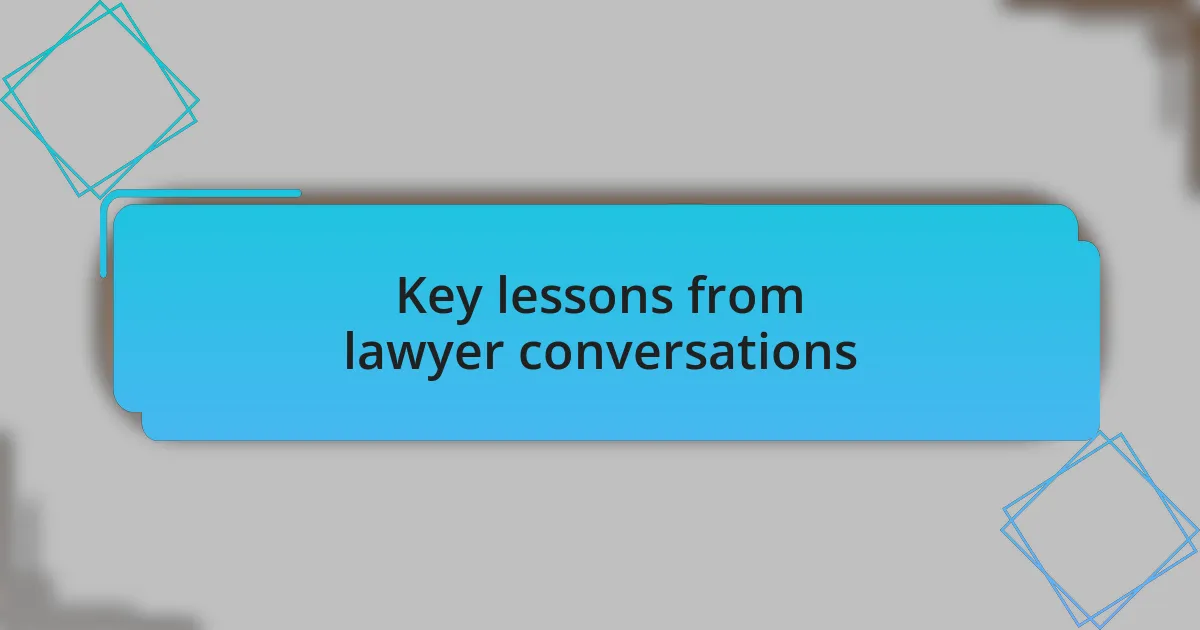
Key lessons from lawyer conversations
One of the most striking lessons I learned from my conversations with lawyers is the legal complexity surrounding corruption cases. I remember discussing a particular case where a lawyer explained the intricate balance between legal frameworks and ethical standards. It made me wonder—how often do individuals in power exploit this gray area? This realization underscored the importance of having sound legal advisement and ethical training in combating corruption effectively.
Another profound insight revolved around the emotional toll these discussions can take on legal professionals who navigate corruption cases. A lawyer I spoke with shared a story about a whistleblower whose life was turned upside down after exposing corrupt practices. It was heartbreaking to hear how the fight for integrity can lead to personal sacrifices. This conversation sparked a deeper empathy within me for those who take a stand against corruption, prompting a reflection on the courage it often takes to prioritize ethics over convenience.
Furthermore, I appreciated the strong emphasis lawyers place on transparency and accountability within organizations. In one dialogue, a lawyer described practical strategies for implementing whistleblower protections, which highlighted how crucial it is to create safe channels for reporting wrongdoing. It left me pondering how organizations can cultivate an environment where employees feel empowered to speak up. This perspective has reinforced my belief that proactive measures are essential in the fight against corruption, and it’s a reminder that we all have a role to play in fostering integrity in our communities.
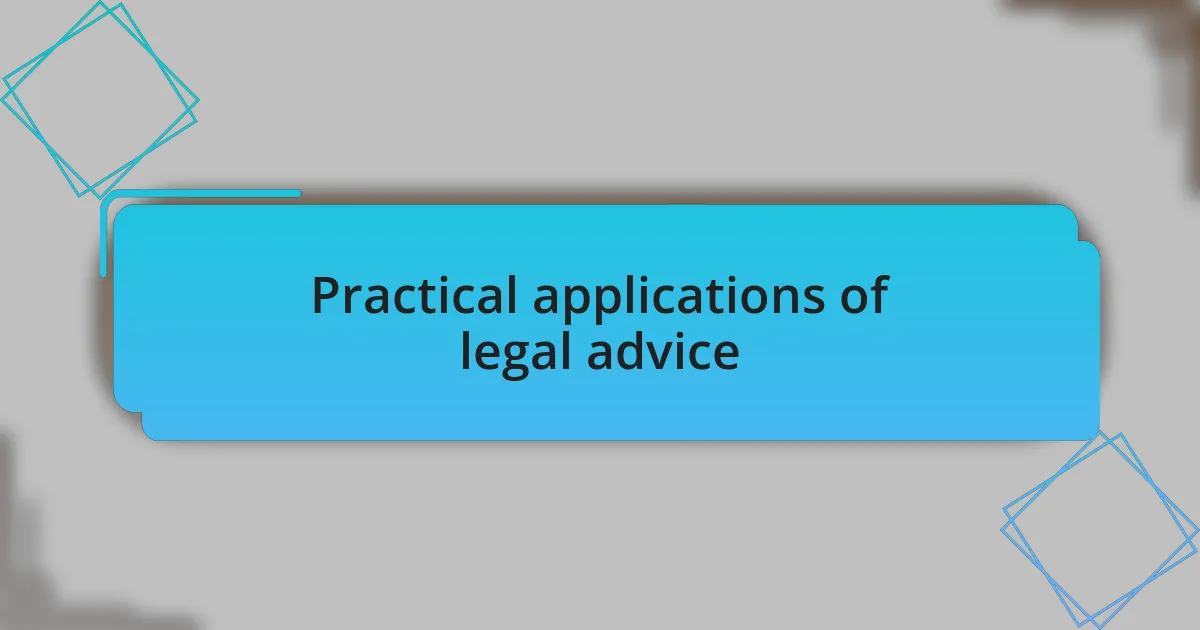
Practical applications of legal advice
Engaging with lawyers revealed that practical legal advice can transform vague ethical concerns into solid, actionable directives. For instance, one lawyer illustrated how drafting clear anti-corruption policies can not only guide employee behavior but also serve as a shield against potential misconduct. I couldn’t help but ask myself—how many organizations overlook this simple yet crucial step in their governance?
I recall a specific instance when a lawyer shared a case involving a company that faced significant backlash due to inadequate reporting mechanisms. They advised that realigning their compliance programs not only restored public trust but also protected the organization from legal repercussions. This made me think about the power of proactive legal frameworks. Could implementing such measures prevent future missteps?
Moreover, I found that lawyers often highlight the importance of continuous legal education for those involved in anti-corruption efforts. One lawyer emphasized how regular training sessions can equip employees with the knowledge to spot red flags before they escalate. It really struck me—what if every workplace took this to heart? The ripple effect could be monumental, fostering a culture where integrity is the norm rather than the exception.